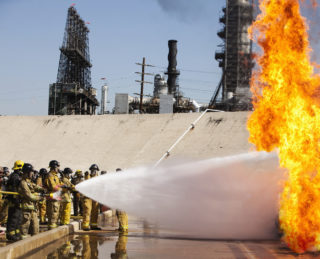Wyoming Supreme Court Rules Refinery Company Can Seek Extracontractual Insurance Recovery Against Holdout Insurer
 In a landmark victory for policyholders, the Supreme Court of Wyoming found that a subsidiary of Sinclair Oil can invoke statutory bad faith damages after prevailing in a coverage dispute with its insurer, Infrassure. The court rejected the district court’s analysis that supported the insurer’s narrow interpretation of the state’s insurance code. On certification from the 10th Circuit, the court found that a policy was “delivered” in Wyoming because the policyholder and the covered risk were in Wyoming. Per the court’s decision, proof of physical delivery beyond the stated headquarters address, to a Wyoming address, was not required.
In a landmark victory for policyholders, the Supreme Court of Wyoming found that a subsidiary of Sinclair Oil can invoke statutory bad faith damages after prevailing in a coverage dispute with its insurer, Infrassure. The court rejected the district court’s analysis that supported the insurer’s narrow interpretation of the state’s insurance code. On certification from the 10th Circuit, the court found that a policy was “delivered” in Wyoming because the policyholder and the covered risk were in Wyoming. Per the court’s decision, proof of physical delivery beyond the stated headquarters address, to a Wyoming address, was not required.
Sinclair sought business interruption insurance recovery from Infrassure and other insurers after a 2013 fire and explosion at its petroleum refinery in Sinclair, Wyoming. The Swiss insurer spurned a settlement between Sinclair and the market of quota share participants and instead sought to litigate the loss. After a panel of appraisers affirmed that the loss value was actually higher than the market settlement that Infrassure rejected – a decision which Bradley later successfully defended on Sinclair’s behalf on appeal to the 10th Circuit – Sinclair sought to recover its attorney’s fees and enhanced interest at 10% under a provision in the Wyoming Insurance Code permitting a fee award and pre-judgment interest when an insurer “refuses to pay the full amount of a loss covered by the policy and that the refusal is unreasonable or without cause.” Although the policy insured a Wyoming company as additional insured and covered refining facilities located in Wyoming, the insurer argued that Sinclair could not invoke Wyoming’s bad faith remedies found in the insurance code, which excludes policies not “issued for delivery” or “delivered” in Wyoming. The Wyoming federal district court agreed with Infrassure’s contention that because there was no proof of physical delivery to the insured in Wyoming, Wyoming law did not apply. On appeal, the 10th Circuit accepted the suggestion from Sinclair’s appellate counsel (Marc James Ayers, with Bradley’s Appellate Practice Group), that the court certify the unsettled and novel question to Wyoming’s highest court to determine the applicability of the statute.
The Wyoming Supreme Court declined to adopt the insurer’s strict interpretation, finding after canvassing the law of many other jurisdictions, that the purpose of Wyoming’s insurance laws was to “protect public welfare and Wyoming residents from being taken advantage of by sophisticated insurance companies,” and that achieving this public purpose mandated a liberal interpretation of the law’s application to Wyoming interests. The court adopted a rule articulated by the New York courts, holding that a policy is “delivered or issued for delivery” in a state when it “covers both insureds and risks” located in that state. Because the Sinclair subsidiary and the insured refinery were in Wyoming, Sinclair was entitled to the protections mandated by the insurance law.
Although the Wyoming Supreme Court’s unanimous ruling directly addresses only Wyoming law, policyholders in other states should consider the impact of the ruling as persuasive authority for a broad application of favorable extracontractual remedies. Most jurisdictions permit fee shifting in at least some instances, and a strategy for recovering the policyholder’s legal expense in addition to the value of the insured loss should be considered at the outset of the litigation. Sinclair’s successful argument, as well as the strategy of seeking certification to a state’s highest court when appropriate, highlights tools that other policyholders may use in master commercial property insurance policies to maximize business interruption insurance recovery.
